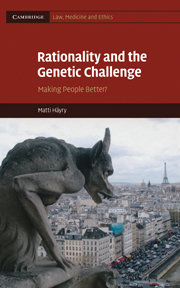Book contents
- Frontmatter
- Contents
- Preface
- 1 Seven ways of making people better
- 2 Rational approaches to the genetic challenge
- 3 The best babies and parental responsibility
- 4 Deaf embryos, morality, and the law
- 5 Saviour siblings and treating people as a means
- 6 Reproductive cloning and designing human beings
- 7 Embryonic stem cells, vulnerability, and sanctity
- 8 Gene therapies, hopes, and fears
- 9 Considerable life extension and the meaning of life
- 10 Taking the genetic challenge rationally
- Bibliography
- Index
10 - Taking the genetic challenge rationally
Published online by Cambridge University Press: 05 July 2014
- Frontmatter
- Contents
- Preface
- 1 Seven ways of making people better
- 2 Rational approaches to the genetic challenge
- 3 The best babies and parental responsibility
- 4 Deaf embryos, morality, and the law
- 5 Saviour siblings and treating people as a means
- 6 Reproductive cloning and designing human beings
- 7 Embryonic stem cells, vulnerability, and sanctity
- 8 Gene therapies, hopes, and fears
- 9 Considerable life extension and the meaning of life
- 10 Taking the genetic challenge rationally
- Bibliography
- Index
Summary
In this chapter, I summarise the assumptions and arguments employed in the ethical analysis of the genetic challenge; present complete versions of the three main approaches to the issue; and conclude that my findings call for changes in the work of philosophers in the field of genethics.
From challenges to solutions
In the previous chapters, I have presented seven challenges that advances in genetics and related fields pose to humanity; three philosophical ways of tackling these challenges; and the main arguments that have been used in ethical debates concerning them. In this chapter, I will summarise my findings and eventually suggest directions into which philosophical studies in this field could be usefully taken. Before formulating this conclusion, however, I must sum up the arguments introduced in the preceding chapters (Sections 10.2, 10.3, and 10.4) and the cases that can be made for and against genetic practices from the viewpoints of the three philosophical approaches (Sections 10.5, 10.6, 10.7, 10.8, and 10.9).
The main arguments presented in the context of the genetic challenge can be divided into six categories: (i) general tenets accepted by all in theory but interpreted in different ways in practice; (ii) more specific arguments that can be used by both sides of the debate; (iii) arguments for advances; (iv) arguments for restrictions; (v) arguments against restrictions; and (vi) arguments against advances. The ensuing layers of counterarguments and counter-counterarguments are infinite, but these six levels should enable me to pin down the main points.
- Type
- Chapter
- Information
- Rationality and the Genetic ChallengeMaking People Better?, pp. 220 - 240Publisher: Cambridge University PressPrint publication year: 2010

